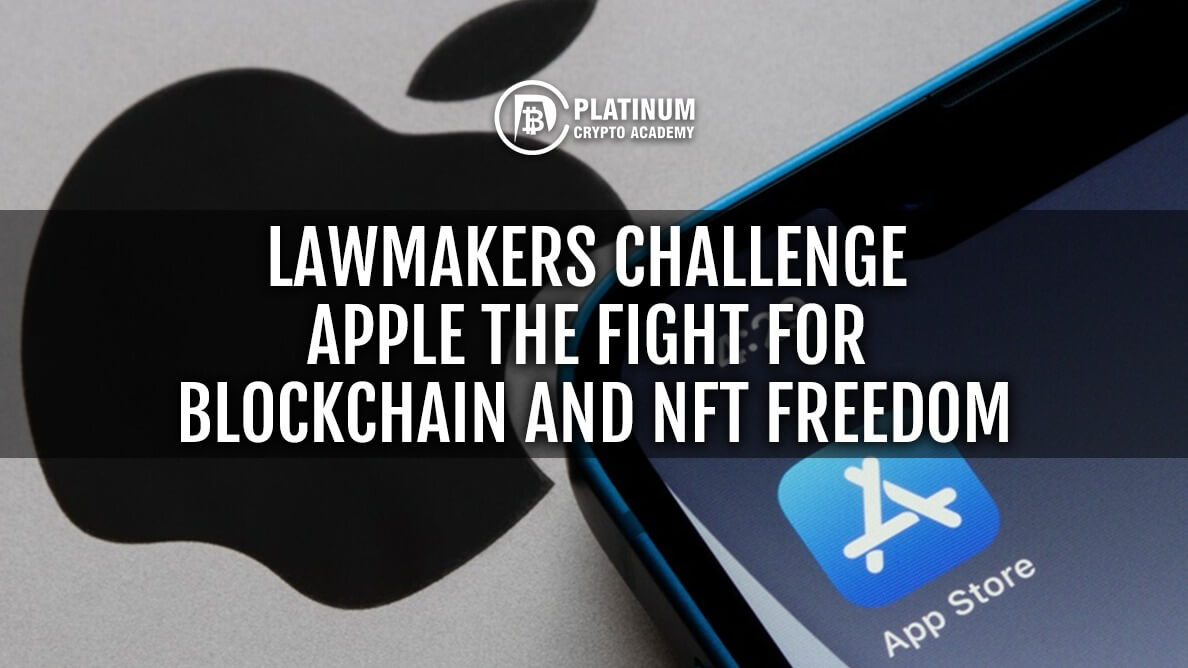In the rapidly evolving world of digital currencies and blockchain technology, Apple’s App Store guidelines have come under scrutiny. U.S. Representatives Gus Bilirakis and Jan Schakowsky have raised concerns about the potential impact of these guidelines on the growth and innovation of blockchain and Non-Fungible Tokens (NFTs).
The Congressional Letter to Apple: A Deeper Dive
On July 28, 2023, U.S. Representatives Gus Bilirakis, a Republican from Florida, and Jan Schakowsky, a Democrat from Illinois, penned a bipartisan letter to Apple’s CEO, Tim Cook. The letter was not just a simple inquiry; it was a call to action, a demand for transparency, and a testament to the growing concern over the tech giant’s influence on emerging technologies.
The lawmakers’ main point of contention was Apple’s approach towards apps that incorporate blockchain technology and Non-Fungible Tokens (NFTs). They highlighted a pattern in Apple’s approach, which they described as capitalizing on these technologies while simultaneously restricting their functionality.
One of the key examples they cited was the case of Axie Infinity, a popular blockchain-based game. Apple’s guidelines forced the game’s developers to release a “lite” version of the app on the App Store. While this version was compliant with Apple’s rules, it offered limited functionality compared to the full version. This, the lawmakers argued, resulted in Apple profiting from the app while users were denied the full benefits of the game’s innovative use of blockchain technology.
The letter also raised concerns about the potential negative implications of Apple’s guidelines on the United States’ position in the global race for technological leadership. The lawmakers pointed out that the current policies could stifle innovation in the blockchain and crypto space, thereby affecting the country’s competitive edge in these technologies.Bilirakis and Schakowsky’s letter is a significant step in the ongoing dialogue about the role of Big Tech in shaping the future of emerging technologies. It underscores the need for a balance between corporate policies, user security, and the freedom to innovate. As the world continues to grapple with these issues, the response from Apple and other tech giants will undoubtedly have far-reaching implications for the future of technology and innovation.
The Impact on Innovation and Security
Apple’s justification for these limitations is security. The tech giant maintains a “walled garden” approach, arguing that strict control over the App Store ensures user safety. However, the lawmakers argue that this approach might suppress competition and hinder the United States’ position in emerging technologies.The letter also raises concerns about the potential negative implications of Apple’s guidelines on American technological leadership. The lawmakers believe that the current policies could stifle innovation in the blockchain and crypto space, thereby affecting the country’s competitive edge in these technologies.
Bilirakis and Schakowsky have called for greater transparency from Apple. They reiterated their commitment to holding Big Tech accountable for potential monopolistic behaviour and promoting a level playing field within the industry for continued American ingenuity and innovation.The concerns raised by the lawmakers reflect the growing scrutiny of technology giants’ impact on innovation and competition. It remains to be seen how Apple will respond to these concerns and what influence this may have on the future of emerging technologies in the U.S.
The Crypto Community’s Response: A Wave of Optimism and Anticipation
The crypto community’s response to the lawmakers’ intervention has been largely positive, with many viewing it as a significant step towards a more conducive environment for the growth of blockchain and NFT technologies.
Sheila Warren, CEO of the Crypto Council, welcomed the congressional inquiry, stating that it further proves that crypto is not a partisan issue. This sentiment was echoed by many within the community, who see the bipartisan nature of the letter as a sign of the growing recognition of the importance of cryptocurrency and blockchain technologies in the economic and technological landscape.
Paul Grewal, Chief Legal Officer at Coinbase, one of the largest cryptocurrency exchanges, also weighed in on the issue. He criticized Apple’s inconsistent application of its App Store policies, questioning whether Americans are well-served by the arbitrary applications of a single giant’s App Store policies. His comments reflect a broader sentiment within the crypto community that Apple’s policies may be stifling innovation and limiting user choice.
The intervention by lawmakers has also sparked hope among smaller developers and startups in the crypto space. Many have faced challenges in getting their apps approved by the App Store due to the current guidelines. The scrutiny from lawmakers could potentially lead to a relaxation of these guidelines, allowing for greater innovation and diversity in the apps available to users.However, alongside the optimism, there is also a sense of anticipation. The crypto community is keenly awaiting Apple’s response to the lawmakers’ letter. The tech giant’s reaction could have significant implications for the future of blockchain and NFT technologies, not just within the App Store, but also in the broader tech industry.
In conclusion, the lawmakers’ scrutiny of Apple’s App Store guidelines has been met with a wave of optimism within the crypto community. However, this optimism is tempered by a sense of anticipation as everyone awaits Apple’s response. The outcome could potentially reshape the landscape of blockchain and NFT innovation in the App Store and beyond.



